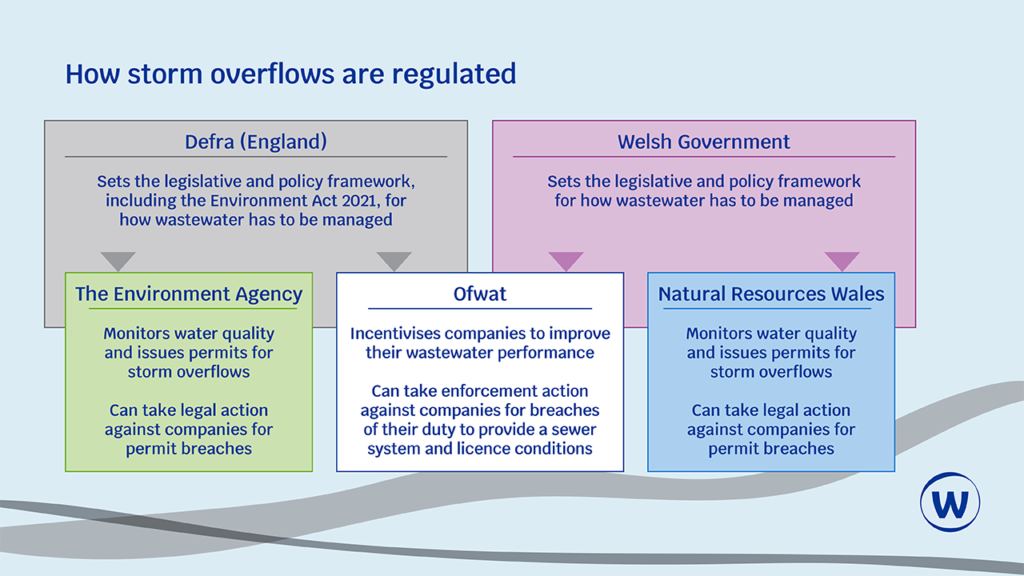What are storm overflows and why are they used?
Storm overflows are designed to act as relief valves when the sewerage system is at risk of being overwhelmed, such as during heavy downpours when a lot of rainwater runs into drains and the sewerage system in a short space of time.
If the system does get overwhelmed it can have dreadful impacts for customers, causing flooding or even backing up into people’s homes in the worst-case scenario.
To prevent that happening water companies sometimes use storm overflows to release extra rainwater and wastewater into rivers or seas.
Spills can also come from storm overflows in emergency situations, for example, if there are sewer blockages or equipment failures at wastewater treatment works.
Overuse of Storm Overflows
At present there is public concern that storm overflows are operating when there has not been significant rainfall. The current levels of harm caused by storm overflow discharges into rivers and seas cannot continue, and the wastewater companies must tackle this.
The operation of storm overflows causes environmental damage and makes it more difficult for people to enjoy rivers and beaches. These impacts are made worse when storm overflows operate when they are not supposed to. We also know that sewage discharge into rivers decreases customer trust in water companies, as highlighted by our customer research.
The causes and impacts of storm overflow use are not straightforward, so various government bodies (Ofwat, the Environment Agency, Natural Resources Wales, Defra and the Welsh Government) are all playing their part in helping to solve the problem of their overuse. For example, the Environment Agency and Natural Resources Wales regulate the use of storm overflows and can grant permits for them in certain circumstances.
Ofwat can set performance targets for wastewater companies related to the management of storm overflows.
Furthermore, when we think wastewater companies are not treating sewage in line with their licence conditions, we can open an investigation and, if necessary, issue fines.
What are Ofwat’s expectations of wastewater companies?
Ofwat have challenged wastewater companies to improve their river water quality action plans. When storm overflows are regularly spilling sewage wastewater companies need to be immediately addressing these issues in line with their legal duties to deal with the sewer contents. Companies need to communicate their improvement plans effectively and clearly to their customers and stakeholders. We also expect wastewater companies to be open and transparent in their data on river water quality.
Improving storm overflows through investing in infrastructure will generate public value in the form of social and environmental benefits: it will also ensure that wastewater companies are operating their assets properly.
As we set out in our PR24 final methodology, we not only expect all wastewater companies to reduce their storm overflows but we will also challenge companies to go beyond the proposed annual average target of 20 spills per overflow by 2025, without additional expenditure allowance.
What action is Ofwat taking to tackle overuse of storm overflows?
In 2021 Ofwat and the Environment Agency announced an investigation into sewage treatment works. This led to us opening an investigation into five wastewater companies (Anglian Water, Northumbrian Water, Thames Water, Wessex Water and Yorkshire Water) in March 2022, extending the investigation into South West Water in June 2022. You can find out more information about the investigation here.
In March 2022 Ofwat sent a letter to wastewater companies calling on them to set out how they were going to tackle the overuse of storm overflows.
In June 2022 we set out our response to companies’ plans, highlighting some good practice but also challenging those who had not set out immediate plans. We also stated that these examples of good practice would set the benchmark for storm overflows at PR24 and that those companies not acting now would face more challenging targets at PR24. We asked companies to work innovatively and collaboratively on a wide-range of solutions, including nature-based solutions.
